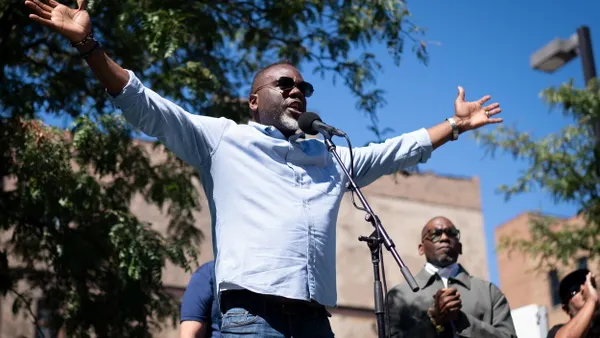Dive Brief:
- Atlanta and Chicago are among the 20 most surveilled cities in the world, according to a recent study from technology research firm Comparitech. The findings compared the number of public CCTV cameras, like those used by government entities, per person in 120 global cities.
- Atlanta, with 15.56 public CCTV cameras per 1,000 people, was the only American city in the top 10, among eight Chinese cities and London. Chicago, with 13.06 cameras per 1,000 people, was 13th on the list, but had the most cameras of any U.S. city with 35,000.
- Overall, six U.S. cities cracked Comparitech’s list of top 50 most surveilled cities: Atlanta; Chicago; Washington, DC; San Francisco; San Diego and Boston.
Dive Insight:
As camera technology improves and data storage and transfer becomes more efficient, cameras and monitors can make a significant impact on public safety. In a statement, Carlos Campos, spokesman for the Atlanta Police Department, said video cameras "play a vital role in keeping our city safe and our goal is to continue adding to the network of cameras we currently have."
Campos clarified that more than 90% of the city's cameras do not belong to the city government, but are from public and private entities and are integrated into the same network. Those cameras are monitored by the city's Video Integration Center at all times, to identify criminal activity as it occurs, prevent crimes and capture evidence to aid investigations.
New technology means that surveillance is only expected to increase. Audio tools like ShotSpotter can be used to detect gunshots and improve police response times. Facial recognition tools have spread to cities, airports and even stores as a way to monitor crowds and find suspects. Amazon has even been granted a patent for a home surveillance system that uses drones.
That rise, however, has sparked a fierce debate about privacy and data security. Cities including San Francisco, Oakland, CA and Somerville, MA have banned the use of facial recognition by government agencies, and civil rights groups have protested the use of new surveillance technology. In its analysis, Comparitech also found "little correlation" between the number of cameras in a city and the crime rate, a finding sure to add to the concerns about the expansion of surveillance.










